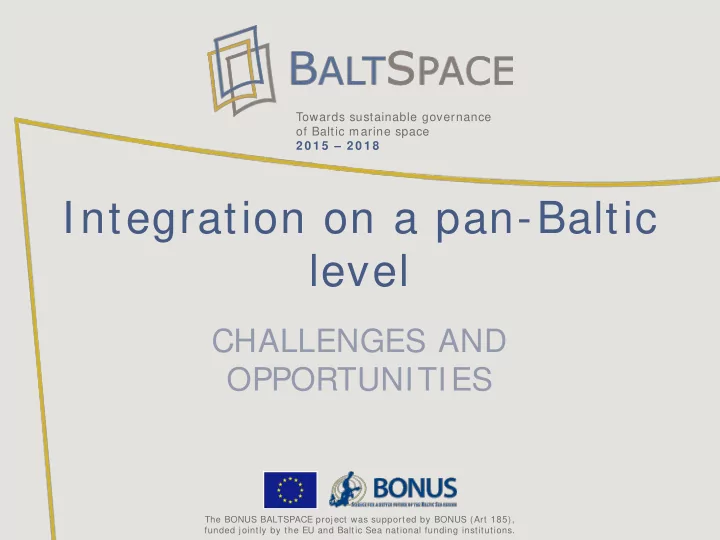

Towards sustainable governance of Baltic marine space 2 0 1 5 – 2 0 1 8 Integration on a pan-Baltic level CHALLENGES AND OPPORTUNITIES The BONUS BALTSPACE project was supported by BONUS (Art 185), funded jointly by the EU and Baltic Sea national funding institutions.
Reminder - What is the BALTSPACE project about? Providing science-based approaches and tools to clarify and im prove AIM the capacity of MSP as a policy integrator in the Baltic Sea Region. Development of a fram ew ork for analysing integration challenges and diagnosing shortcomings and inefficiencies of MSP in the Baltic Sea Region. CORE ACTIVITY FIELDS Identifying and showing barriers and enablers for improved Focus for this session effectiveness and efficiency of Baltic Sea governance on the basis of strategically selected case studies . Evaluation, improvement and development of innovative approaches and tools designed to enhance integration of MSP processes. Development and testing of new com m unication formats with MSP stakeholders to improve their understanding of MSP and to better integrate their views and needs. Integration on a pan-Baltic level – challenges and opportunities 25.11.2016 2 Anne Luttmann, IOW
Integration Challenges Challenge: Multi-scale and Challenge: Policy and sector integration transboundary integration • Integration of environmental policies • Integration between different BaltSpace (e.g. MSFD) and Blue Growth geopolitical scales (e.g. local, • Sectorial integration in public policy regional, national, international) Case Studies (e.g. maritime transports, fisheries, Integration of MSP across national • tourism etc.) borders • Integration of public, private and • Integration of MSP and terrestrial voluntary sector activities planning Pan- Baltic (H-V MSP WG) South- Eastern western Baltic Baltic Challenge: Integration of knowledge (DK/SWE, GER) (LT/LV, PL) base and science support • Interdisciplinary integration • Integration of sectorial knowledge Challenge: Stakeholder integration and science support • Integration of stakeholder knowledge, Development of science-based • critique etc. in MSP approaches for addressing critical • Institutional frameworks for integration challenges linked to scales stakeholder participation. of time and space, policies, sectors • Timing, methods/tools and their and stakeholder involvement and acceptability, who, why in stakeholder communication involvement. Integration on a pan-Baltic level – challenges and opportunities 25.11.2016 3 Anne Luttmann, IOW
Example for transboundary integration challenge Exam ple: Guideline for the Mutual agreement im plem entation of the on definitions and ecosystem -based approach in key principles is MSP in the Baltic Sea area cumbersome - Process from 2010 – 2016 BARRIER - First plan was to formulate Respecting both the common understanding and environm ental and present condensed document to ministerial conferences sectoral way of 2013/ 2014 thinking Work continued in 2 nd mandate - SOLUTION (2014-2016) - Agreement could be reached, Promoting mutual compromises necessary understanding and - Ecosystem approach vs. ecosystem- based approach accepting tradeoffs - HELCOM principles (e.g. BAT, PPP) only partly included ENABLER Integration on a pan-Baltic level – challenges and opportunities 25.11.2016 4 Anne Luttmann, IOW
Invitation for discussion Object of discussion: Guideline for the im plem entation of ecosystem -based approach in MSP in the Baltic Sea area Questions: What were critical points of discussion during the process of establishing the guideline? What were obstacles and drivers to resolve these critical points? Picture: nbjenglish.wikispaces.com Integration on a pan-Baltic level – challenges and opportunities 25.11.2016 5 Anne Luttmann, IOW
Invitation for discussion Object of discussion: Guideline for the im plem entation of ecosystem - based approach in MSP in the Baltic Sea area Questions: What were critical points of discussion during the process of establishing the guideline? What were obstacles and drivers to resolve these critical points? Picture: nbjenglish.wikispaces.com Food for thought: Have you for exam ple discussed about… … which stakeholders should be involved in the establishment process of the guideline – was it thought to be an exercise purely on administrative level or were others from outside the WG also involved to some extent? … which knowledge to include and why – scientific, own knowledge from practitioners viewpoint, sectoral knowledge (environmental, fisheries sector,… ), knowledge from other political bodies (CBD, UNESCO, MSEG MSP ,… )? … how to include the transboundary aspect of MSP? … the linkage of spatial planning on land and at sea? Integration on a pan-Baltic level – challenges and opportunities 25.11.2016 6 Anne Luttmann, IOW
Invitation for discussion Good Environmental & Blue Growth Object of discussion: Status (GES) Guideline for the im plem entation of ecosystem -based approach in MSP in the Baltic Sea area Questions: The guideline betw een environm ental protection and prom otion of hum an activities at sea. Which side dominated the discussion? Has there been a change over time? Picture: nbjenglish.wikispaces.com Integration on a pan-Baltic level – challenges and opportunities 25.11.2016 7 Anne Luttmann, IOW
Recommend
More recommend